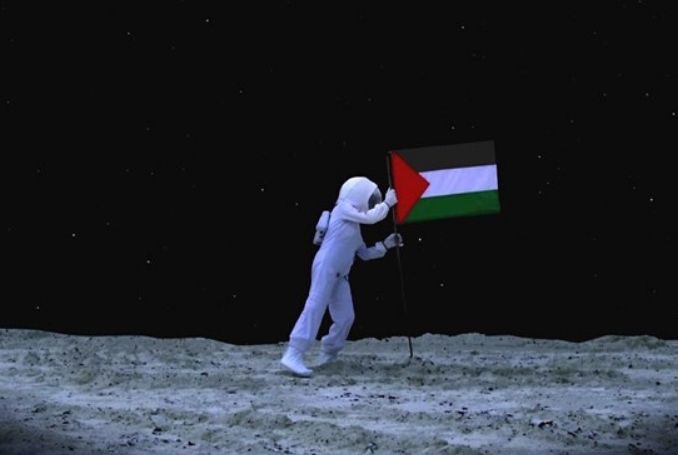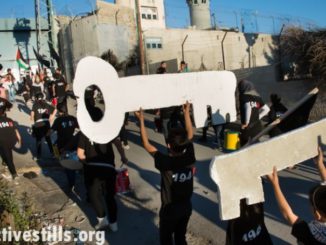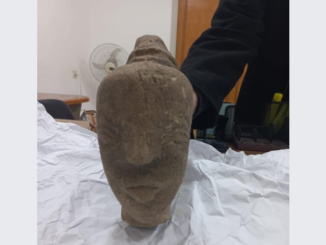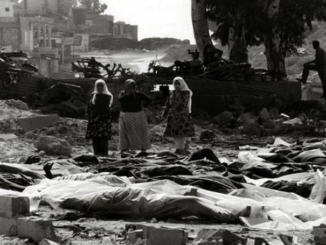
By Benay Blend
The title quote is taken from Martin Luther King’s Speech in 1967 on August 16, 1967, at the Eleventh Annual Southern Christian Leadership Conference in Atlanta. Summing up past achievements, he noted that the movement had caused the “walls of segregation” to “tumble down,” a victory that he felt had to come before other gains.
He understood, however, that the struggle was far from over, so at this watershed moment he asked, how the movement might address “restructuring the whole of American society.”
In the era of coronavirus, Trump’s Deal of the Century, and general uncertainty about the future of humanity, the present feels increasingly dystopic. How then do Palestinian practitioners of science fiction, such as the filmmaker and writer Larissa Sansour, continue to view this genre as a vehicle for creating an alternative future? How can society be restructured in the future, as King many years ago suggested when the present seems so bleak?
“I contextualize Middle Eastern politics in futuristic settings,” Sansour explains, an effort on her part, perhaps, to foster hope that there will indeed be a Palestinian future. Best known for her science fiction films and installations, Sansour most recently presented her video “Heirloom” at the Venice Biennale in May 2019. Less well-known but equally interesting was her graphic novel co-written with the Israeli artist Oreet Ashery. In The Novel of Nonel and Vovel (2009), the authors created their respective alter egos based on repeated typos of the term “novel” in their initial skyping.
Arab Futurism, writes the scholar Lama Suleiman, is the “idea of actually revising the past in a way that is more imaginative.” Consistent with that genre, The Novel concerns itself with what has not yet happened, a literary effort that is in full flight from the almost unbearable reality of the Occupation. Although Sansour does not identify as an Arab Futurist, Perwana Nazif relates that the way in which her work resonates with those who have “marginalized backgrounds” places it within the boundaries of the field.
For Palestinian writers, there was a break in time after Al-Nakba, the 1948 catastrophe, and since then, Palestinians have been severed from the land. Because of these ruptures, many hold tightly to the past while longing for an imagined time that is yet to come.
Sometimes leaving behind her persona to use present tense, Vovel admonished her cohort: “I’m sorry, Nonel, but that refers to my ex-persona only. Stop clinging to the past, woman,” thereby suggesting new avenues to use historical trauma as a springboard towards a liberated future.
Reclaiming agency by imagining a future Palestine, an idea which is particularly urgent post-Trump’s Deal of the Century, the pair spend much of the book fantasizing about destroying the Occupation. Their dreams become reality when they learn that the real puppet master is Dharq Djumper, ruler of the Fifth Planet, and a villain who wants to turn earth into an intergalactic vegetable garden divested of human beings. Along with a hive of feminist purple ninjas, the duo plot to destroy the evil villain.
Much like the iconic image of 20-year-old A’ed Abu Amro, seen swinging a slingshot over his head, the pair destroy the gaseous planet by flinging a bomb from their giant slingshot transported on their backs. Implying that the consequences of the Occupation will continue long after liberation, Vovel notes that “it was more like a saturated pre-credit to a 007 flick than a full-blown epic”.
Nonel replies that “every ending is a new beginning” and besides, she continues, it would seem wrong to believe that they had managed to solve an old dilemma by “dressing up in capes and tight suits” (168). Though simplified by taking the conflict out of its present arena where it seems impossible to solve, the authors understand that peace will bring about a complex reconstructive process that could last for years.
Flash forward to Sansour’s installation Heirloom for the Danish Pavilion at the 2019 Venice Biennial. At its center is its short film In Vitro, set in a post-apocalyptic bunker in Bethlehem. In this film two survivors of an ecological disaster—Dunia (Hiam Abbass), a dying fighter, and Alia (Maisa Abd Elhadi), her progeny and clone, discuss the past and future.
“It’s about a group of scientists who managed to escape the surface of the Earth, just days before the apocalypse, and they recreated civilization in a bunker underneath the city of Bethlehem, raising a whole generation that has never seen the face of the Earth and has only experienced life in that bunker,” Sansour explains.
An exchange between them plays upon the dualities of past and present, nation-states and the illusions upon which they are built. Asserts Sansour, “The dialogue oscillates between questions of inherited trauma and historical narrative to personal and collective memories”:
“Alia: I don’t believe in ghosts. We’re not rebuilding the past.
Dunia: There’s no need to. The past is still there, as intact as ever.
Alia: Maybe your past is, the only past I know is here. Everything else is just fairy tales.
Dunia: Entire nations are built on fairy tales.”
Influenced by Ingmar Berman’s 1966 film Persona, Sansour’s current work has none of the whimsicality of her graphic novel. As Nat Muller, curator of Heirloom explains, her work has shifted from “absurdist,” an effort to resist portraying Palestinians as either victim or terrorist, to “dystopian,” perhaps more in tune with the times. Moreover, while she still focuses on the Middle East, it is no longer only about the Palestinian situation.
Perhaps a hint of that lies in The Novel, when Nonel and Vovel find out that it is really a third party controlling the entire world, not Israel or the United States. Her current work more clearly deals with the “universal,” “locality” that she claims centers the “argument to a specific place” but “makes it stronger when applied to a wider debate.”
As Sansour notes, “What is happening in the Middle East right now is central to many of the world’s problems and should concern all of us.”
This perspective is particularly relevant as solidarity between Indigenous struggles because increasingly important today. For example, in an article “Solidarity Between Palestinians and Indigenous Activists Has Deep Roots,” Marian Kawas explores the history of reciprocal support between Palestinians and Indigenous movements on Turtle Island.
“It all goes back to colonialism,” says Sansour, and how to deal with that. Its not just the problem of Palestinians, she continues, but really the burden of the entire world, especially the colonizing powers. In the end, it goes back to the hope which Futurism of any sort provides.
As Nat Muller claims, science fiction in the work of Sansour “becomes a vehicle in which imaginaries and future scenarios can be challenged and tested, and in which individual narratives and personal experiences intertwine with collective ones; it becomes a place and time in which remembrance and forgetfulness compete, and where the past, the present, and even the future, might be dispossessed. Nevertheless, it is also is a realm of possibility, of alternative world-making, if not radical alterity.”
In the words of my friend Rima Najjar on post-Super Tuesday 2020: “Dashed hopes last night, but getting over it. After all, we Palestinians teach life, Sir. And, all is not lost.”
– Benay Blend earned her doctorate in American Studies from the University of New Mexico. Her scholarly works include Douglas Vakoch and Sam Mickey, Eds. (2017), “’Neither Homeland Nor Exile are Words’: ‘Situated Knowledge’ in the Works of Palestinian and Native American Writers”. She contributed this article to The Palestine Chronicle.

– Benay Blend earned her doctorate in American Studies from the University of New Mexico. Her scholarly works include Douglas Vakoch and Sam Mickey, Eds. (2017), “’Neither Homeland Nor Exile are Words’: ‘Situated Knowledge’ in the Works of Palestinian and Native American Writers”. She contributed this article to The Palestine Chronicle.







